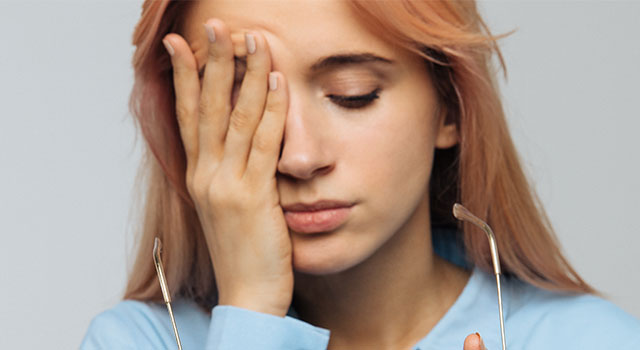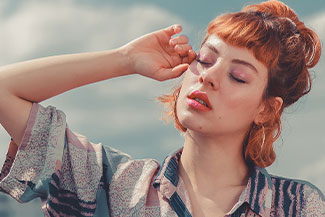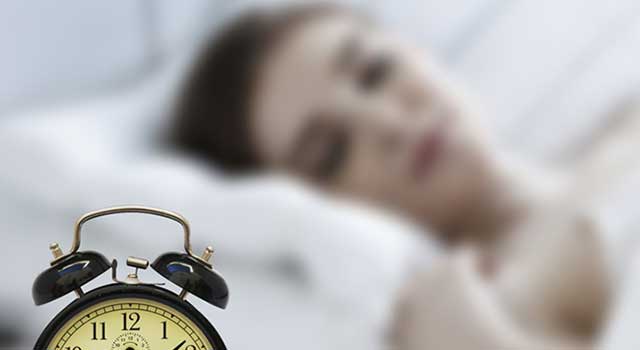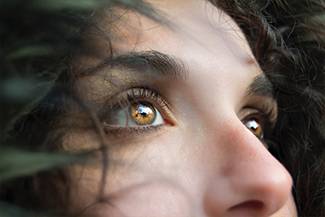
Are Your Contact Lenses Causing Dry Eye?
Among the more frequent complaints, eye doctors receive from patients is that their contact lenses are making their eyes dry. While dry eye syndrome (DES) is very common among both contact lens wearers and non-wearers alike, the symptoms can be more severe and uncomfortable if you wear contact lenses. Typically, DES symptoms include irritated, red and itchy eyes.
The best way to deal with contact lens-induced dry eye syndrome is to visit our optometric team, so we can determine exactly why your eyes are dry and provide ways to increase your comfort while wearing contact lenses.
What Is Contact Lens-Induced Dry Eye?
The cornea, the front of your eye, is the only area of your body that receives oxygen directly from the air. One reason contact lens wearers are predisposed to dry eyes is because the contact lens on your cornea can partially block oxygen from entering the eye. Although many contact lenses are designed to allow larger amounts of oxygen to permeate the eye, wearers can still experience dry, gritty eyes, especially towards the end of the day.
Another cause of contact lens-induced dry eye is the lenses’ absorption of tears. Lenses need liquid to stay soft and maintain their shape and integrity.
This is known as contact lens-induced dry eye.
In a healthy eye, tears allow the contact lens to comfortably swim in the tear film above the cornea. A shortage of lacrimal fluid can lead to gaps in the tear film, causing the contact lens to irritate the surface of the eye. That, in turn, causes pain, redness and itchiness.
This effect can be further exacerbated if the lenses are low in quality or are poorly fitted to the eye. Such contacts absorb too much liquid from the tear film, causing the eye to lose vital moisture. This can also occur when traditional soft lenses are worn for an extended period of time.
Getting Relief for Contact-Lens Induced Dry Eye
The following can provide relief from contact lens-related dry eye.
- Eye drops – Be sure to get eye drops that can be applied safely with contact lenses to reduce discomfort and refresh eyes. If, for any reason, the over-the-counter eye drops aren’t working, consult our optometric team, who can provide more effective treatment options.
- Eye vitamins – Certain vitamins, taken orally, can increase the amount of nutrients your eyes receive. This not only improves eye health, but also increases contact lens comfort. The best eye vitamins and supplements include lutein, zeaxanthin, Vitamin A, Vitamin C and Omega-3.
- Silicone hydrogel contact lenses – These lenses are made from the most innovative contact lens material available on the market. They are extremely breathable because they permit up to 5 times more oxygen to reach the eye than older-generation contact lenses. This allows them to be worn over a long period of time. They reduce dryness and boost comfort.
- Low water content contact lenses – It is a common misconception that the higher the water content, the more comfortable the contact lens. For certain wearers, particularly those suffering from dry eyes, it can have the inverse effect. High water contact lenses allow more oxygen to flow to the cornea but over time, as they lose liquid, they draw it from the tear film, thus exacerbating dry eye symptoms.
- Daily disposable contact lenses – Also called dailies, these single-day contact lenses are a great option for dry eye sufferers. This is because protein deposits don’t have the time to build-up and cause discomfort, and lenses don’t dry out as a result of improper cleaning routines.
- Scleral lenses – These large-diameter rigid gas permeable (GP) lenses vault over the entire corneal surface, ensuring that the front surface of the eyes don’t dry out. The liquid reservoir between the lenses and the cornea provides a continuous moist environment that protects the cornea and provides relief for those with dry eyes.
- Orthokeratology – Would you like to wear contact lenses only when asleep? Orthokeratology (or ortho-k) is a gas permeable contact lens prescribed for overnight wear only. These lenses reshape the cornea while you sleep and temporarily correct nearsightedness and other refractive errors, thus enabling you to see clearly during the day without any need for contacts or glasses. This reduces contact lens-related dry eye symptoms.
- Adhering to the hygiene routine advised by your eye doctor – Those who wear monthly lenses need to adhere to a specific hygiene routine advised by their eye doctor. If you’re using the wrong solution or not cleaning your lenses properly, this could be why you’re suffering from dry eye. Keep in mind that not all multi-purpose cleaning solutions are designed to clean silicone hydrogel contact lenses, so make sure the solution you’re using is correct.
There is also a chance you may have sensitive eyes and that your dry eye symptoms may be an adverse reaction to the preservatives in the solution. If your eyes feel irritated, yet you are using your regular cleaning solution, speak to our optometric team, who will recommend a preservative-free lens solution for improved comfort.
Tips to Avoid Dry Eye When Wearing Contact Lenses
 To prevent eye dryness or inflammation, we recommend the following tips:
To prevent eye dryness or inflammation, we recommend the following tips:
- Make sure you’ve been fitted for your contact lenses by an eye doctor, as the eye practitioner can determine the exact strength and curvature of the contact lenses you need, and recommend the most suitable lenses for your eyes.
- Regularly get your eyes examined for vision acuity and general ocular health. Contact Rosen Optometry Inc. today for a comprehensive eye evaluation.
- Purchase high-quality lenses and make sure they have good oxygen permeability. Lenses with hyaluronan, particularly silicone hydrogel lenses, are excellent for people prone to developing dry eyes. Hard lenses also come highly recommended, as they draw very little liquid from the tear film.
- Until you find a better solution, do not wear contact lenses for extended periods. If you suffer from dry eyes, it is best that you only wear them for a few hours and on special occasions, such as for an outing or to play sports. Avoid wearing contact lenses when watching TV or working at your computer, as these place a strain on your eyes.
- Make sure to dispose of lenses every day, fortnightly or monthly, depending on what your eye doctor recommends. Your contact lens containers should also be changed every few weeks to prevent any germ build-up.
- Avoid wearing contact lenses when ill with a cold or the flu, as there is an increased risk of transferring germs into the eyes. Remove contact lenses if you have an eye infection like conjunctivitis (or pink eye), as germs can build up extremely well underneath them.
If you wear contact lenses and struggle with dry eyes, ask your Rosen Optometry Inc. eye doctor about scleral lenses. our optometric team will patiently assess and explain your condition to you, and will provide solutions and treatments for optimal visual clarity and comfort. Fortunately, there’s a vast array of contact lens types and brands available, so those who fear that they may have to discontinue contact lens wear altogether need not worry.
Call the Rosen Optometry Inc. today to schedule your consultation.
Our practice serves patients from St. Louis, Byrnes Mill, Cedar Hill, and Imperial, Missouri and surrounding communities.














